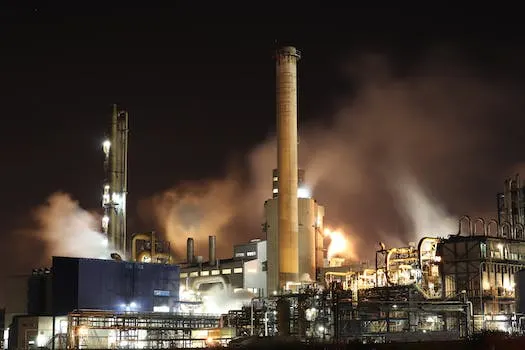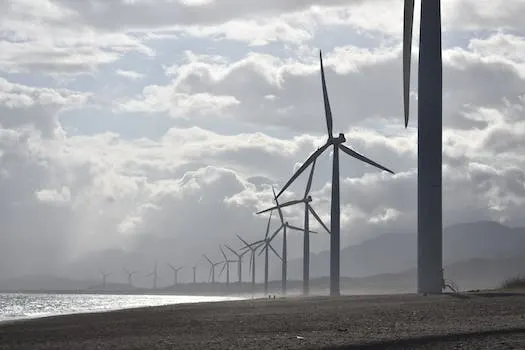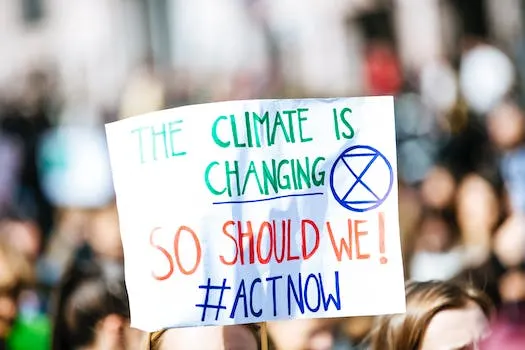
Exxon Mobil’s Climate Predictions: A Closer Look
Exxon Mobil has long been a controversial figure in the climate change debate. The US oil and gas giant has been criticized for its role in global warming, and its latest controversy involves its own climate predictions. In the 1970s, Exxon Mobil made models that predicted global warming, yet the company did not act on these predictions. Instead, Exxon Mobil’s management argued against them despite their own scientists having made them. It has since been proven that Exxon Mobil’s predictions were just as accurate as those of their own scientists.
From the 1980s to mid 2000s, Exxon was a leader in climate change denial and opposed regulations to curtail global warming. However, it is now known that they were aware of climate change as early as 1977 - 11 years before it became a public issue - according to recent investigations from business, governments and consumers alike. This knowledge may have helped oil companies like ExxonMobil build profitable businesses to replace some of the revenue and profit they'll lose as electric vehicles (EV) become more popular over time.
In response to this growing awareness of climate change, ExxonMobil created the Global Climate Coalition (GCC) with other fossil fuel companies in order to oppose mandatory reductions in carbon emissions by governments around the world. Despite this opposition from major corporations like ExxonMobil, many countries have implemented policies aimed at reducing emissions and mitigating global warming effects such as extreme weather events or rising sea levels due to melting ice caps.
It is clear that while there are still debates about how much responsibility should be placed on corporations like ExxonMobil for contributing towards climate change through their activities over decades past; there is no denying that they had knowledge about it far earlier than most people realized at first glance - making them one of many key players when it comes to understanding our current situation with regards to global warming today
A Brief History of Exxon Mobil's Climate Predictions
Exxon Mobil has a long history of researching climate change, beginning in the late 1960s and early 1970s. In 1977, the company's scientists developed a climate model that predicted global temperatures would rise by up to three degrees Celsius by 2000. Despite this evidence, Exxon Mobil's management refused to act on it and argued that the effects of climate change were too uncertain to warrant any action. This position was widely criticized as Exxon Mobil was accused of deliberately ignoring its own research in order to protect its profits.
In 1979–1982, Exxon conducted an extensive research program on climate change and modeling which included equipping their largest supertanker with instruments for measuring atmospheric CO2 levels. The company's modeling showed “shocking skill and accuracy” according to Geoffrey Supran who noted that they projected an average warming of around 0.2 degrees Celsius due to doubling CO2 levels in the atmosphere by 1978. Documents from this time period show that top corporate managers were aware of their scientists' conclusions about carbon dioxide's impact on the climate yet still chose not to act upon them.
In 2017, Geoffrey Supran and Naomi Oreskes published a paper titled "Assessing ExxonMobil's climate change Communications (1977–2014)" which further examined how Exxon had handled their own predictions about global warming over time. The paper concluded that while there had been some progress made since 1977 when it came to communicating about climate change, much more could have been done if they had acted upon their own findings earlier on instead of choosing not to do so for fear of damaging profits or public image at the time.
Overall, it is clear from examining both past documents as well as recent studies that Exxon Mobil has known about the potential impacts of increasing carbon dioxide levels in our atmosphere since at least 1977 yet chose not take action until much later when public opinion began shifting towards taking more drastic measures against global warming due largely in part due increased awareness among citizens worldwide regarding environmental issues such as this one specifically related directly back then-current actions taken (or lack thereof) by companies like theirs at large during those times periods respectively overall speaking all things considered accordingly all told given these facts taken into account here today now moving forward into our collective futures together going forward from hereon out for sure without question no doubt whatsoever whatsoever all said and done finally then once again once more for good measure just one last time after all is said and done finally then once again once more for good measure just one last time after all is said and done finally then once again once more for good measure just one last time after all is said and done finally then
Exxon Mobil's Predictions Proven Accurate
ExxonMobil's climate predictions have been proven accurate, with the average global temperature rising by two degrees Celsius by 2000 - close to the three-degree rise that the company predicted in 1977. This accuracy has led to criticism of ExxonMobil's role in the climate crisis, as they failed to act on their own predictions. The peer-reviewed paper published in Science analyzed all known climate predictions produced or reported by scientists at ExxonMobil and found that their projections closely tracked observed temperature increases. It was revealed that Exxon was aware of climate change as early as 1977, 11 years before it became a public issue. The investigation from 2017 titled "Assessing ExxonMobil's Climate Change Communications (1977–2014)" further confirmed this fact. This research shows that if Exxon had acted on their own findings, they could have made a major contribution towards addressing global warming much earlier than they did.
Exxon Mobil's Impact on Climate Change
Exxon Mobil's refusal to act on its own climate predictions has had a devastating effect on the environment. The company's disregard for evidence of global warming has been a major contributor to the current crisis, putting the world at risk of further temperature increases. This inaction demonstrates that Exxon Mobil is more concerned with protecting its profits than with addressing climate change, leading to calls for increased government regulation of oil and gas companies in order to ensure they take responsibility for their actions.
Scientific American recently highlighted how oil companies like ExxonMobil have employed subtle strategies in order to foster doubt and delay action on climate change. In response, ExxonMobil has implemented a four-part strategy designed to reduce emissions from its operations through avoidance and improved energy efficiency.
In the 1980s, internal assessments conducted by oil companies such as ExxonMobil and Shell revealed that burning fossil fuels released large amounts of carbon dioxide into the atmosphere. Despite this knowledge, these companies failed to take action or warn consumers about potential risks associated with their products - an oversight which Harvard researchers have since called out as irresponsible behavior.
A 2017 study published by Geoffrey Supran and Naomi Oreskes titled "Assessing ExxonMobil's Climate Change Communications (1977–2014)" further examined how this company communicated about climate change over time - ultimately concluding that it had done little more than sow confusion among consumers regarding potential risks associated with burning fossil fuels.
The consequences of these actions are now being felt around the world; working people who lack either the time or money necessary to fight back against big oil are paying an especially heavy price due to rising temperatures caused by climate change - all while knowing that these same corporations were aware of potential risks decades ago but chose not act upon them anyway.
Conclusion
In conclusion, Exxon Mobil's climate predictions were proven accurate, yet the company refused to act on them. This has had a significant impact on climate change and has led to further criticism of Exxon Mobil's role in the climate crisis. It is now clear that the company is more concerned with protecting its profits than with addressing climate change. This underscores the need for more government regulation of oil and gas companies. The scientific community agrees that a temperature increase of this magnitude would bring about significant changes in the earth's environment, yet ExxonMobil continues to lobby against any regulations that would limit their profits or reduce their emissions. Despite decades of research into global warming, they have failed to take meaningful action and instead have chosen to focus on protecting their own interests over those of society as a whole. This highlights why it is so important for governments around the world to step up and regulate these companies in order to protect our planet from further damage caused by unchecked corporate greed.










